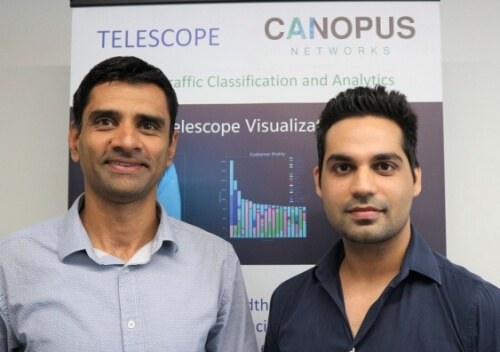Buffering, please wait: how a UNSW invention could mean you never see this message again
21-February-2019

Network providers could revolutionise how they manage changing loads on their networks, making life a lot better for internet users, thanks to technology being developed by two Indian Institute of Technology (IIT) graduates now working at Sydney-based University of New South Wales (UNSW).
Professor Vijay Sivaraman from UNSW’s School of Electrical Engineering and Telecommunications, earned a BTech degree in Computer Science from IIT Delhi in 1994, and his research protégé Himal Kumar, who earned a BTech degree in Electrical and Electronics Engineering from IIT Patna, founded Canopus Networks in March last year, after realising the commercial potential of their research in 2016, according to a press release from UNSW.
 |
|
UNSW Prof Vijay Sivaraman (left) with his protege Himal Kumar
|
“We know hardware is very good at doing repetitive tasks working at high speeds, whereas software is good at being intelligent and flexible. Our product 'Telescope' uses a combination of these and artificial intelligence to optimise the use of bandwidth in a network,” Professor Sivaraman said.
UNSW further stated that discussions with Google revealed the need for a more effective solution for internet service providers (ISPs) and network providers to optimise bandwidth use.
Network providers such as Telstra and Optus monitor their internet traffic to optimise how they allocate bandwidth between different activities, such as streaming movies or web browsing, which comes at an enormous cost.
Current solutions to do this include custom hardware – proprietary systems that are hugely expensive – or software that runs on computers that cannot be easily scaled to handle large amounts of data. This means that networks can only monitor a small portion of their traffic (5-10%) and make assumptions about usage from there.
Telescope examines all traffic passing through a network and in a matter of seconds knows what it is.
“For example, if it’s a Netflix stream, which is large and likely to run for a while, we offload it to hardware,” said Professor Sivaraman who has been working at UNSW for 14 years.
When providers can separate hardware and software and use each in the most effective way, they can achieve full visibility into network traffic – at very high speeds for very low cost.
“Our clients will instantly see the mix of traffic on their network – how much bandwidth YouTube is using, how much Netflix is being streamed, how much data is being used on downloads, web browsing, etc.
“This visibility is the first key to understanding and managing the network better, to improve user experience without buying more bandwidth, but by allocating it in a different way.”
The technology was seeded through two research collaborations between UNSW and Optus from 2016 to 2017 and then evaluated via a paid trial with a large telecommunications network provider in 2018, which validated the commercial opportunity and led to the creation of Canopus Networks.
Ranked among Top 50 universities in the world UNSW has placed a high priority on translating academic research into commercial outcomes, as outlined in its 2025 Strategy.
“UNSW, home to more than 60,000 students from nearly 130 countries, has been attracting a growing number of bright Indian students for Undergraduate and Post Graduate studies in Business, Commerce, IT, Engineering, Design & Architecture”, says Laurie Pearcey, Pro Vice Chancellor (International), UNSW.
UNSW Dean of Engineering Professor Mark Hoffman quoted in the press release said it is important for researchers to focus their talents on areas with the greatest potential to make a positive impact on humanity’s major challenges. Commercialisation of that research was a key step in realising that impact, he said.
“Whether it be ensuring the best use of network bandwidth such as this, or innovations in mining, energy, space or other areas, universities must focus on research and development that tackles society’s biggest challenges to achieve relevant outcomes for Australia and the world.
“ Canopus Networks has the potential to reshape an entire industry and examples such as this demonstrate the true value of university research to society,” Professor Hoffman said.
“I look forward to the day that buffering is obsolete.” – TWL BUREAU
Hindu-Muslim DNA Same’: Shiv Sena (UBT) Heaps Praise on RSS Chief for Meeting Community Members
Chennai to Host Immersive Murder Mystery Dinner at Park Hyatt on August 1
Bharatsure Secures Rs 6 Crore, Offers Insurance to 1,500+ EV Stations Across India
14 Dead in Thai-Cambodia Clashes; Indian Tourists Urged to Avoid Border Provinces
Modi to Join 1,000-Year Celebration of Rajendra Chola I’s Gangetic Conquest









